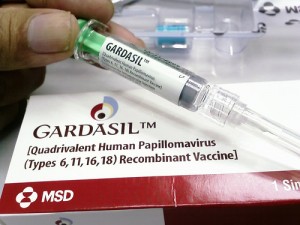Last week, we reported on the American Academy of Pediatrics’ recommendation that doctors “pre-prescribe” Plan B for teenage girls, the logic being that, in the event of an accident, it’s a lot easier to dig through your sock drawer than to find a ride to an urgent care clinic. Critics worry that prior prescription will encourage promiscuity, but we presented evidence from several studies that argue otherwise.

This debate is reminiscent of the one surrounding Gardasil, the HPV vaccine approved in 2006 and now recommended by the Centers for Disease Control for all pre-pubescent boys and girls. HPV can cause both genital warts and cervical cancer, and most sexually active Americans will contract it at least once in their lifetimes, according tothe CDC, even if they never realize it.
Championed by public health officials and covered by most insurers, Gardasil has nevertheless been slow to take off. First, there are the conspiracy theorists, who see Big Pharma’s greedy machinations behind every new drug, or subscribe to Andrew Wakefield’s theory that childhood vaccines cause autism. (Despite both doctor and data having been thoroughly discredited, a 2011 NPR poll showed that 21 percent of Americans still buy into the bogus claim.)
Then there are the civil libertarians, who hate states’ “no school without shots” laws. “To have innocent little 12-year-old girls be forced to have a government injection through an executive order is just flat-out wrong,” Michele Bachmann argued at a Republican presidential primary debate last year, and later told Fox News, “There’s a woman who came up crying to me tonight after the debate. She said her daughter was given that vaccine. She told me her daughter suffered mental retardation as a result of that vaccine.”
Finally, there are the family values folks, who wring their hands over Gardasil for the same reason they do over Plan B—the lasciviousness! The promiscuity! What will happen to the innocence of youth?
The answer, apparently, is nothing. A Kaiser Permanente study, published in Pediatrics in October, followed 1,400 girls, aged 11 and 12, a third of whom received Gardasil and two-thirds of whom did not. (Nationally, the researchers estimate, just half of eligible girls in the U.S. have received any part of the three-shot course.) After three years, the vaccinated girls were no more likely to have become pregnant or contracted a sexually transmitted infection than their unprotected classmates.
“We saw no increase in pregnancies, sexually transmitted infections or birth control counseling—all of which suggest the HPV vaccine does not have an impact on increased sexual activity,” Robert Bednarczyk, an Emory University epidemiologist, was quoted in a release that accompanied the study.
The finding comports with a British study, published earlier this year in Vaccine, which surveyed 1,000 teenage girls and found that Gardasil didn’t encourage high-risk sexual behavior or discourage condom use. (The vaccine is offered free-of-charge to schoolgirls in the U.K., and the inoculation rate among pre-teens is as high as 84 percent.) Despite national fears that Gardasil would prove “yet another green light on the road to promiscuity,” as one Daily Mail writer phrased it, the data simply didn’t support such hysterics.
There are plenty of good reasons for parents to worry themselves sick about their teenage daughters. The HPV vaccine, like Plan B, isn’t one of them.





